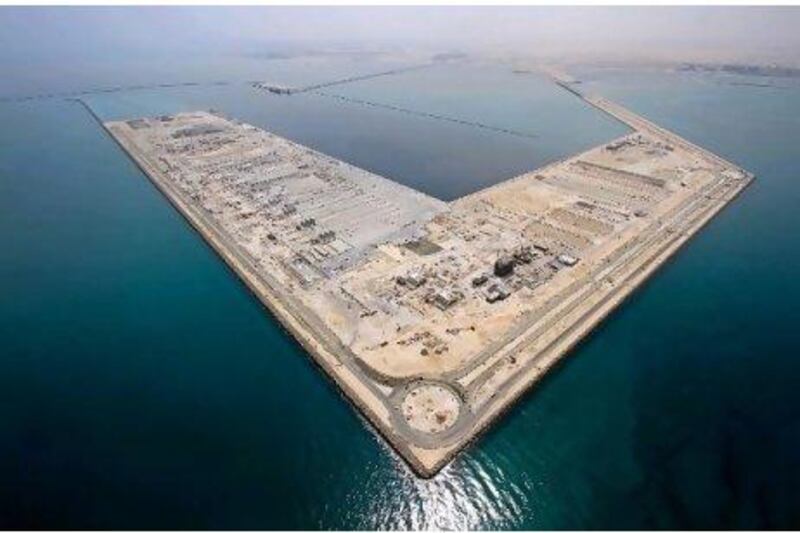The new manufacturing hub, which is expected to open late next year in Taweelah, about halfway between Abu Dhabi island and the Dubai border, is drawing attention from local and foreign companies. Eventually, it will also offer seaport and rail connections, writes Neil Parmar.
Factbox: Key manufacturing groups being targeted by Kizad officials:
Trade and logistics This site is designed to include both pre-built warehouses and leased land plots, ranging from 1.5 hectares to 50 hectares, for companies intending to build their own storage facilities.
Aluminium Emirates Aluminium, a smelter complex that supplies the metal, is the anchor for this cluster. Other companies being targeted include those specialising in metal products within the construction, transport and packaging industries.
Food This cluster is planned to feature companies that manufacture food products locally. The goal is to drive down the costs of importing many of the staple and processed goods that are shipped to local grocery stores and supermarkets throughout the UAE.
Paper products Kizad officials are marketing the UAE's connections to India and China to entice paper manufacturers to enterthis cluster. The manufacture of paper requires a lot of energy and water, and distribution costs over long distances are high because of the weight of paper.
Majid Murshed Al Shehhi is eager to get his polymer business built in the Khalifa Industrial Zone Abu Dhabi (Kizad).
After all, the manufacturing hub will eventually connect Mr Shehhi's business, Seaman Technochem, to a shipping port and train network.
He thinks both features will make it easy to transport raw materials for his company, which recently started trading polymer products from Dubai and plans to build a factory in Kizad next year.
Yet Mr Al Shehhi, who is the company's operations manager and runs it alongside his brother, is thinking of first building a factory in Sharjah in case the one planned for Kizad encounters construction or production hitches.
"There might be a delay," says Mr Al Shehhi.
As officials at Kizad prepare to open its first phase, Area 1, in the final quarter of next year, they say they are garnering plenty of attention from foreign companies as well as local businesses.
"We're very busy processing applications," says Mustafa Khdair, the senior manager for business development at Kizad. "The interest is strong."
But company owners are also carefully weighing how the hub's development plans fit with their own business strategies. One obstacle that may prevent some from signing a lease in Kizad is the "lack of availability of local talent", warns Jitendra Gianchandani, the managing partner of the business advisory company Jitendra Consulting Group.
The industries that will be clustered in Kizad are going to require employees with technical expertise, and many of those have migrated to other countries, says Mr Gianchandani.
"Hence companies coming to Kizad [have] to bring people from outside, and it will cost more," he says.
Experts say certain free zones in the UAE are also competing with Kizad and other economic hubs by offering different incentives or lower costs for land, work visas and electricity.
Some free zones are even making a fresh push into manufacturing.
An official behind Dubai Healthcare City and DuBiotech says the two zones are in talks with companies about producing medical goods in the emirate.
If finalised, these agreements could yield investments of between US$50 million (Dh183.6m) and $100m.
At the same time, certain business clusters may end up contributing to Kizad's growth.
"We look at Kizad as an extension of our client base," says Ahmed Baghoum, the director of City Zone at Masdar City, which houses companies that focus on research and development but may also need goods produced locally.
"When it comes to manufacturing, Kizad is one of [their] solutions," says Mr Baghoum.
Kizad is in Taweelah, almost equidistant between the capital city and Dubai.
That's a convenient location for Mr Shehhi, who says he frequently travels between the two emirates and drives the stretch of the E11 motorway that splits Kizad's 417 square kilometres into two parts.
One 51-sq-km zone includes sites for manufacturers that will be organised in industrial clusters according to their specialisations, as well as some worker residences and a major shipping port. The remaining 366 sq km remains mostly undeveloped desert - for now.
Yet some local business owners are not completely sold on the idea of relocating there from the capital.
"It's going to be a little far," says Rovshan Suleyman Oglu, the operations manager for KNR Fiberglass Solutions, which installs and maintains piping systems for oil and gas companies.
KNR currently operates in the Musaffah Industrial Area in Abu Dhabi. For the time being, it buys piping from different manufacturers but plans eventually to start making its own.
During recent discussions, Kizad has come up as a possible location for launching a KNR production facility or branch.
"Musaffah is almost full," notes Mr Oglu. "Kizad - it's new and everyone's going to cluster there."





